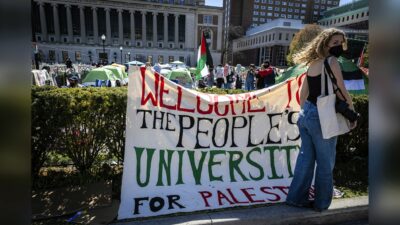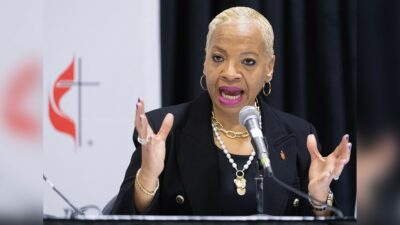More than 100 churches are suing the Florida Annual Conference of the United Methodist Church to immediately disaffiliate from the denomination.
The lawsuit comes amid a slow-moving schism in the United Methodist Church largely over the ordination and marriage of its LGBTQ members.
And, according to the head of a new, theologically conservative Methodist denomination that recently split from the United Methodist Church, it likely won’t be the last.
“Florida is the first of what I would anticipate might be a number of similar lawsuits occurring,” said Keith Boyette, transitional connectional coordinating officer of the conservative Global Methodist Church.
In the lawsuit — filed Thursday in Bradford County, Florida, by the National Center for Life and Liberty — 106 churches allege the requirements for disaffiliation approved by a special session of the United Methodist Church’s General Conference are “onerous, and in many cases, prohibitive.”
Your tax-deductible gift helps our journalists report the truth and hold Christian leaders and organizations accountable. Give a gift of $30 or more to The Roys Report this month, and you will receive a copy of “Hurt and Healed by the Church” by Ryan George. To donate, click here.
That disaffiliation plan allows churches wishing to leave the denomination over its stance on sexuality to take their properties with them through 2023 after paying apportionments and pension liabilities. It was added to the Book of Discipline by General Conference delegates in 2019 alongside legislation called the Traditional Plan that strengthened the denomination’s language barring the ordination and marriage of LGBTQ United Methodists.

The annual conference is using the disaffiliation plan and the denomination’s trust clause to “hold for ransom Plaintiff Churches’ real and personal property,” according to the suit, when previously existing provisions in the Book of Discipline allow churches to simply deed their properties to other evangelical denominations.
Meanwhile, the lawsuit alleges the Council of Bishops and its past president — Bishop Ken Carter, who heads both the Florida and Western North Carolina conferences — are not abiding by the same Book of Discipline. Among other things, it said they did nothing as the California-Nevada Annual Conference elected the denomination’s first openly LGBTQ bishop, the Illinois Great Rivers Conference certified its first drag queen as a candidate for ministry and the Western Jurisdiction declared itself a “safe harbor” for LGBTQ clergy.
In a written statement in response to the lawsuit, Carter said the Florida Annual Conference was “deeply grieved by this, as we seek to be a church united in love and in mission.”

The Florida Annual Conference is committed to the “gracious exit” provided in the Book of Discipline and has tried to engage churches in that process, according to its bishop’s statement.
Leaving abruptly without making the payments required by the disaffiliation plan approved in 2019 could damage benefits and pensions for retired pastors, he wrote. Apportionments support camps, campus ministries, natural disaster responses, missions abroad and the United Methodist Children’s Home.
“We ask that, despite their haste, these groups seeking to break away live up to the responsibilities established by the General Conference in 2019, and that they not cause pain, damage or disparage other United Methodist churches, other members in their churches or other pastors, or the Conference,” Carter wrote.
Florida has emerged as an early indicator of what schism may look like as it begins to unfold across the United Methodist Church.
Days after the Global Methodist Church launched in May, the Wesleyan Covenant Association’s Florida chapter announced 107 churches were disaffiliating from the United Methodist Church and planning to join the new denomination. The WCA confirmed most of those churches are participating in the new lawsuit.

At the Florida Annual Conference meeting this summer, delegates reportedly rejected a slate of 16 people on track to become ordained elders or deacons because two of them were openly gay.
They also approved 14 disaffiliations.
Boyette, head of the Global Methodist Church, said he expects those numbers to increase this fall when a number of United Methodist annual conferences are scheduled to hold special sessions regarding disaffiliations.
“Most of those churches are making their way to the Global Methodist Church,” he said.
That includes “virtually all” of the churches named in the lawsuit against the Florida Annual Conference, according to Boyette, who said he is not involved in the lawsuit.

The Global Methodist Church launched this year after a third postponement of the United Methodist Church’s 2020 General Conference, which was set to consider a proposal to split the denomination, allowing churches to disaffiliate with their properties to form new conservative expressions of Methodism. It now has several hundred clergy and nearly 100 churches worldwide, Boyette said.
In recent weeks, moderate and progressive leaders who helped negotiate the proposal, called the Protocol of Reconciliation & Grace Through Separation, have rescinded their support. Bishops who were part of the negotiating team, including Carter, released a statement affirming the work that had been done on the proposal and trusting it to delegates who may still consider it at the next General Conference, now scheduled for 2024.
Meanwhile, Boyette said, some annual conferences are requiring lengthy discernment periods and additional financial obligations that weren’t outlined in the 2019 disaffiliation plan from churches wishing to leave.
“All of that has taken a situation that could have been and was directed in an amicable way toward resolution to make it a very contentious, conflicted situation,” he said.
“So, in my mind, it’s not surprising that churches feel like they have no recourse but to resort to litigation at this point, and that’s what essentially I believe that leadership in the United Methodist Church has invited by taking the steps that they’ve taken,” Boyette added.
 Emily McFarlan Miller is a national reporter for Religion News Service.
Emily McFarlan Miller is a national reporter for Religion News Service.




















6 Responses
Without addressing the underlying issues that have created the present division among the two factions of the United Methodist Church, I write to observe that the requirement that each departing church pay its share of any unfunded pension obligations seems to be a responsible way for the denomination to (a) allow for an orderly disaffiliation of those churches that desire to depart, and (b) make reasonable arrangements to pay the vested pension obligations owed the clergy members and other church employees with vested benefits under the various pension plans sponsored by the denomination as they come due. If each departing church was a private sector entity, the GAAP accounting rules would require that such church’s share of any unfunded liability be reflected as a liability on the entity’s balance sheet. To suggest that a departing church should not shoulder its share of any such liabilities is a disservice to its own former clergy members and other employees owed such benefits.
Gordon,
In principle, I agree. Churches paying their unfunded pension liability seems reasonable. I’m not opposed to it.
Its fair to say the situation is a little more complicated though. In American history we talk about taxation without representation. Theologically orthodox Methodist churches have a fair point when they say that the denomination, and specifically, their conference in Florida, have not upheld their side of the relationship, in so many ways.
Further, the Bishop’s office appears to be working to suppress and intimidate, churches that are interested in disaffiliation. There have been numerous reports of representatives of the Bishop’s office showing up at private meetings and attempting to threaten attendees by recording or photographing them. Police have been called, according to pastors at these meetings.
I don’t blame them for saying enough is enough.
I grew up in the Methodist church and am happy to see churches standing for biblical truth!
Good for them. The UMC has not been a real denomination for quite some time. This is a Jezebelian brothel of a “church” (Revelation 2:20). The individual churches trying to secede have every right to cut all ties with this cult of a fraud of a political movement.
Now, just you watch… 99% if not more of those opposing this split will call themselves “pro-choice”.
Here’s the thing. Facts are pesky buggers. Those who have deviated from Wesleyan theology and the Book of Discipline have created an environment of lawlessness. The basically defunct Council of Bishops won’t enforce rules and chaos is the result. So, smaller churches who want to adhere to solid Biblical doctrine are left having to pay very large sums of money to leave the denomination when in fact, the denomination left them.
I was employed by the UMC for 17 years and I’ve seen the good, the bad and the ugly. A friend’s congregation of 250 would have to pay over $200,000 to exit and that’s simply wrong. I understand the retired pastors shouldn’t have to suffer, but maybe the ones who’ve strayed should foot the larger part of the bill…
Just my two cents…
The assertion that pre-2019 discipline allowed churches to “simply deed their property to another denomination” is false.
As i understand this, the lawsuit is from churches who don’t want the disaffiliation rules to apply to them. You can’t sue a conference for following their own rules.
This is more of the toxic spirit these people bring to the church. They aren’t motivated by a clear conviction of faith, they are motivated to disrupt and destroy. It is impossible to be in community with such misleading, selfish, spiritless jerks. The Global Methodist Church is failing, people don’t want to be a part of it, and they need someone to blame. Thus, lawsuits about the managing disaffiliation by the rules is “unfair”.